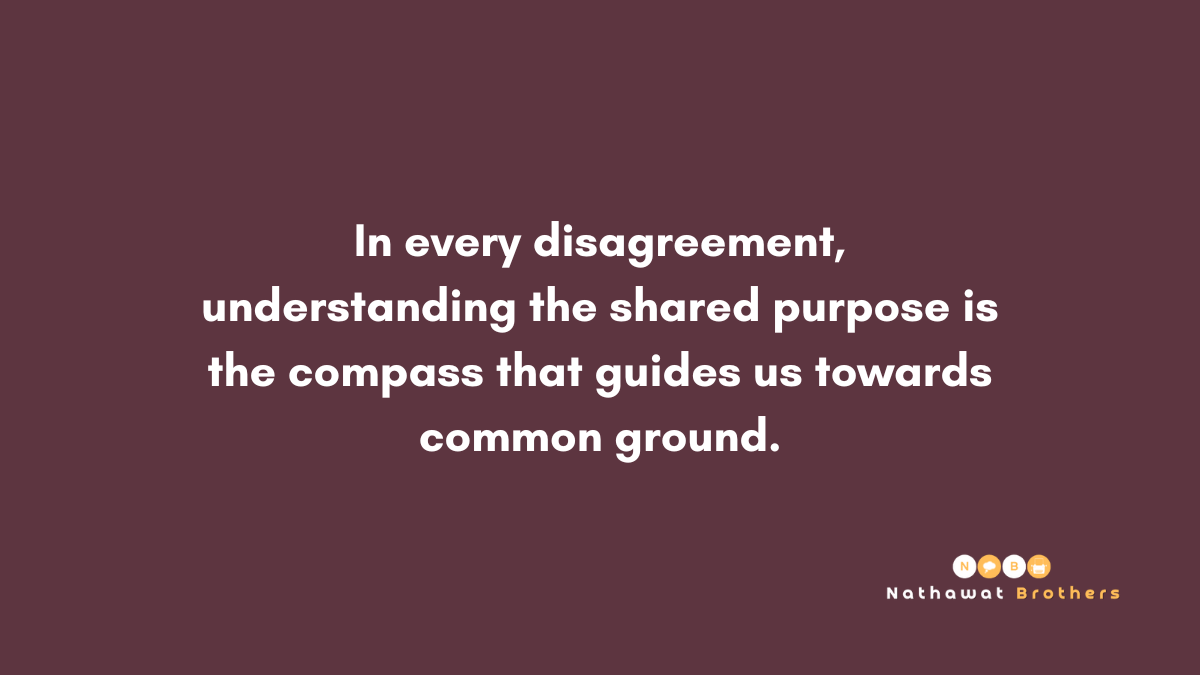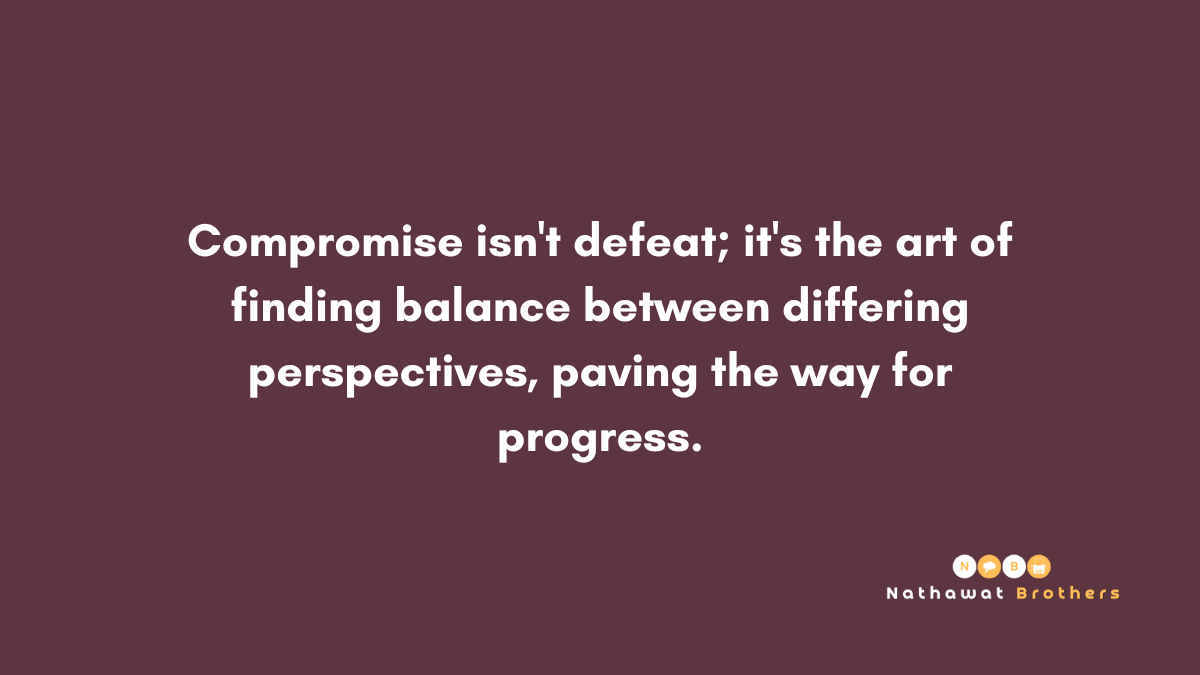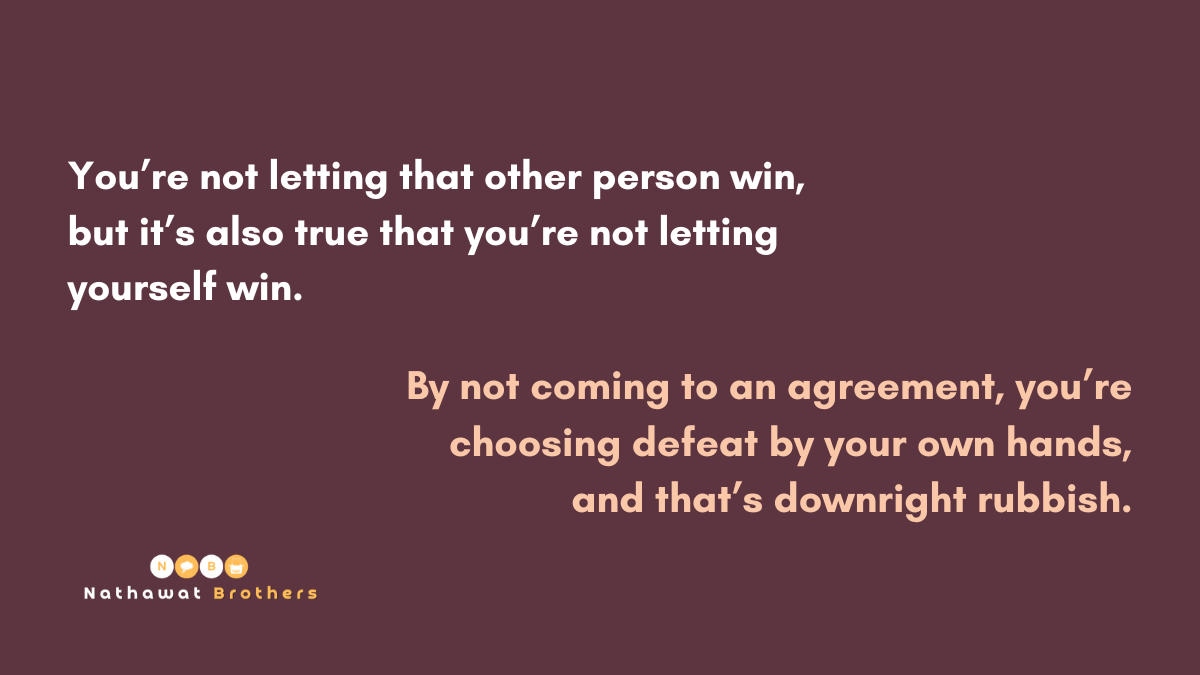If you see two people arguing over something, then you’ll notice it’s hard for them to come to an agreement.
Perhaps you’re the one who’s arguing, and it’s really hard for you to agree.
Worry not.
We know that the other person is wrong, and you’re totally right.
But whatever the situation is, you want to move forward. It’s foolish not to come to terms and keep arguing.
Yes, you’re absoooooolutely correct.
But hey, don’t waste time and go for the way forward.
It’s hard—we know that—but by choosing not to come to an agreement, you’re not doing yourself any favours. Yes, you’re not letting that other person win, but it’s also true that you’re not letting yourself win.
By not coming to an agreement, you’re choosing defeat by your own hands, and that’s downright rubbish.
It’s like when you both want to go out, but one wants to walk, and the other wants to ride a bicycle. By not agreeing, you’re not giving your body a chance to exercise.
You are on your own hands, grounding yourself at home and making your flesh rot.
Hence, it’s good to reach an agreement, whether you’re right or wrong, and this article will help you do it efficiently.
If you’re ready, let’s begin.
How Can Two People Agree With a Solution If Their Expectations Are Different?
There’s no shortcut, and there’s no magic pill. 💊🎩
Yet, considering the following five points and agreeing with one of them will allow you to come to terms easily.
Furthermore, it won’t hurt your ego, perhaps. 🤣
Before we start, on a not-so-friendly note, we’d like to request please put your ego in your closet and then continue.
1. You Need to Understand the Purpose Behind Finding a Solution
If you know the WHY behind needing a solution, it helps guide the discussion.
Are you trying to save money, improve efficiency, or achieve a specific goal?
Focusing on this common purpose can keep you working together.

Imagine you and your partner want to redecorate the living room. You dream of a modern, minimalist space while they crave a cosy, traditional vibe.
What’s the underlying goal?
Maybe it’s creating a more inviting space for entertaining friends.
Discussing this “why” helps you brainstorm solutions that blend both styles, like incorporating modern furniture with warm textures and accent pieces.
2. You Equally Need to Minimise Your Expectations
Being flexible with your initial expectations allows for a broader range of solutions.
Explain your ideal outcome, but also be open to alternative approaches that meet the overall purpose.
Let’s say you’re collaborating on a work project with a colleague.
You envisioned a flashy presentation, but they prefer a data-driven, concise approach.
Instead of clinging to your initial image, consider your colleague’s point.
Maybe a well-designed presentation with clear data visualisation hits the sweet spot!
3. To Come to An Agreement, Both Need to Understand You’re Not Enemies
Sometimes, disagreements with loved ones can feel personal.
Disagreements about finances, for example, can trigger anxieties.
Take a deep breath and remind yourselves that you’re working towards a common goal—financial stability for your future.
Approach the conversation with “I” statements (“I feel anxious when…”) to express your concerns while acknowledging their perspective.
4. One Must Need to Compromise–Sacrifice Brings Result or Movement
Finding a solution often involves some give-and-take.
Be prepared to adjust your expectations a bit and encourage the other person to do the same.
Maybe your friend wants a weekend getaway full of adventure while you yearn for some relaxation.

Striking a balance might involve a day hike followed by a spa afternoon.
In relationships, compromise doesn’t mean one person always gives in. It’s about finding ways to take turns fulfilling each other’s needs.
5. Taking Time Will Bring Clarity
Don’t force it, let it breathe.
Sometimes, heated discussions need a time-out. Let each other cool down and revisit the issue later with a clearer head.
This “sleep on it” approach allows you to process the situation and approach it with fresh eyes, making compromise more likely.
Here are some additional tips:
- Active Listening: Pay close attention to what the other person is saying, both verbally and nonverbally.
- Brainstorm Together: Come up with multiple solutions as a team, then evaluate them together based on your shared purpose.
- Be Clear and Communicate: Express your needs and interests clearly, and be open to hearing the other person’s point of view.
If you can reflect on the above and follow any one of them, then sooner you’ll come to terms.
You’ll know where you’re making the mistake and where you need to step back.
Often, it’s about our winning attitude. In simpler words, it’s our ego that cannot accept anything other than what we have already accepted in our minds.
But if you remain open, you’ll find better ways to satisfy yourself and improve teamwork.
Therefore, just try, and you’ll be dammed to heaven.

We hope you liked this short read on how to come to an agreement and would love to read more. So, please subscribe to our free newsletter and share this article as much as you can.
If you want to support our writing, you can donate to us with all your kindness.
Follow us on different social media platforms and learn good things to become a better human.
Nathawat Brothers
Putting thoughts for everyone